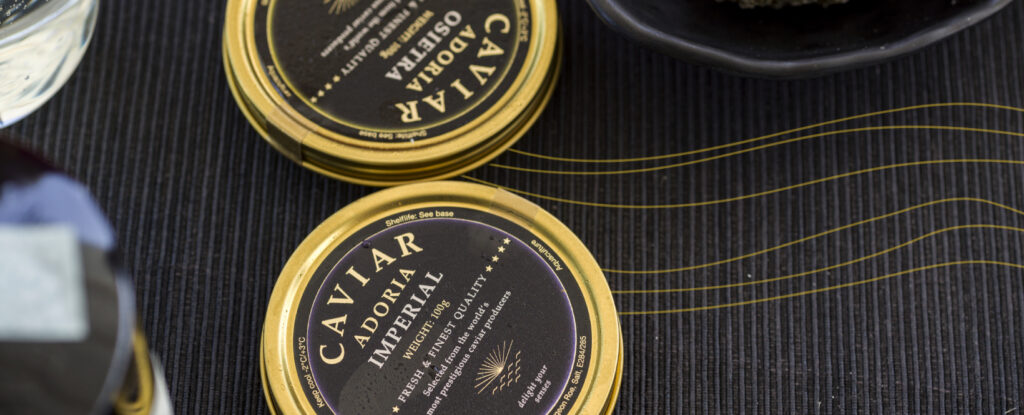When aiming for timeless excellence with a touch of modernity aboard your yacht, few products can rival ADORIA caviar and DISÌ drinks. These two iconic elements perfectly embody a balance between traditional sophistication and contemporary innovation, promising your guests experiences of pure luxury and pleasure.
ADORIA Caviar
When it comes to luxury and refinement, few products can compete with the elegance and quality of ADORIA caviar. For yacht owners and guests, nothing better represents the opulence and pleasure of a marine experience like the unique and unforgettable taste of this exquisite caviar.

Varieties of ADORIA Caviar
OSIETRA
Osietra Caviar is renowned for its firm and crunchy texture, intense and flavorful aroma, and creamy, nutty taste. The eggs, ranging in color from grey to black with golden highlights, come from Russian sturgeons Acipenser Baerii and Gueldenstaedtii.
IMPERIAL
Imperial Caviar is characterized by its bright golden color, delicate and slightly nutty aroma, and eggs that melt almost in the mouth. Considered one of the highest-class caviars, the eggs are from a crossbreed of Acipenser Schrenkii and Huso Huso.
BELUGA
Beluga is the world’s most sought-after caviar, known for its delicate and creamy flavor. The eggs have an iridescent grey hue and a soft, delicate taste due to their fine skin.
ADORIA not only symbolizes luxury but also sustainability. The brand is committed to responsible farming practices that respect the environment and ensure the longevity of sturgeon species.
Why Choose ADORIA?
Superior Quality: Each ADORIA caviar pearl is carefully selected to offer the utmost in taste and consistency. Guaranteed Freshness: Thanks to advanced preservation methods, the caviar arrives fresh and delicious, as if just harvested. Elegance and Style: ADORIA’s packaging reflects the class and elegance of the product itself, perfect for an exclusive environment like a luxury yacht. ADORIA caviar is more than just food; it’s a symbol of prestige, quality, and tradition. For yacht owners looking to offer the best to their guests, ADORIA is the ideal choice. Refined, sustainable, and unmatched in taste, it’s the perfect addition for creating moments of pure magic at sea.
DISÌ
Drinks If you’re looking for a refreshing, low-calorie beverage perfect for your relaxation moments aboard a yacht, look no further than DISÌ. This hard seltzer, unique in the Italian landscape, is crafted with natural ingredients, offering a light and sparkling taste experience.
Features of DISÌ
DISÌ stands out for its freshness and use of real fruit pulp, making it an ideal choice for those who want a drink that is as delicious as it is healthy. With less than 5% alcohol and only 30 calories per 100 ml, DISÌ is perfect for guilt-free enjoyment. It’s also gluten-free and vegan, suitable for everyone.

Available Flavors
DISÌ is available in three delightful flavors, each designed to deliver a unique experience:
- Cherry Wave: With the flavor of red berries, it’s the perfect aperitif for both chill moments and lively adventures.
- Tropical Breeze: An explosion of joy and laughter with tropical notes that make you feel like you’re on vacation.
- Lemon Cruise: Ideal for those always on the move but also for those who prefer to relax. A refreshing lemon taste that pleases everyone. Why Choose DISÌ?
DISÌ is more than just a beverage; it’s a way of life. Created for those who love to find zest in life, DISÌ is perfect for relaxing and having fun. It’s the ideal choice for an aperitif aboard a yacht, with its natural aromas and crispness that make it truly unique.
Discover more and let yourself be carried away by the freshness of DISÌ.
Contact us to know more about luxury news and choose what fits perfect with your experience.
